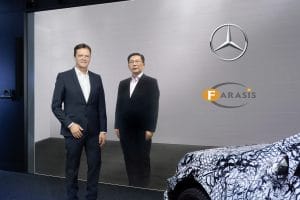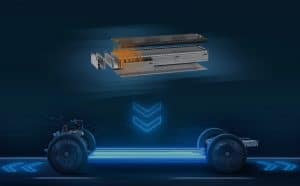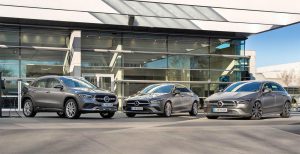
Mercedes’ Markus Schäfer, left, and Yu Wang, founder and CEO Farasis, announce the automaker’s move to take a stake in the Chinese battery manufacturer.
Mercedes-Benz is pushing ahead with what the company describes as its “electric first” strategy by taking an equity stake in a Chinese maker of battery cells – Farasis Energy.
The announcement of the new partnership represents another “important milestone towards Mercedes-Benz’s “Ambition2039” carbon dioxide-neutral goal,” the German automaker said.
“We are very pleased to further expand our partnership with Farasis in taking a decisive step within the implementation of our electric strategy ‘Electric first,’” said Markus Schaefer, member of the Board of Management of Daimler AG and Mercedes-Benz AG, responsible for Daimler Group Research and Mercedes-Benz Cars COO.
(Mercedes, Nvidia creating new cutting-edge software architecture for 2024 model year.)
“By strategically expanding our business relationship, we are pushing the electrification of our model portfolio ahead. With this agreement, we contribute our expertise in the field of battery cell development.”

Mercedes-Benz is looking increase its ability to meet the growing demand for EVs through a partnership with Farasis.
In order to be able to meet increasing demand for German Mercedes-Benz plants in the future, Farasis is building a plant for battery cells in Germany, creating up to 2,000 new jobs, Schaefer added.
Hubertus Troska, member of the Board of Management of Daimler AG, responsible for Greater China, said, “China is the world’s largest electric car market with tremendous potential for further development.”
Troska added by taking a stake in a Chinese battery cell manufacturer for the first time, the automaker is leveraging the potential of “advanced technology partners in the market, enabling us to ensure our electric strategy globally.”
Key elements of the agreement include the development and industrialization of highly advanced cell technologies, accompanied by ambitious goals for cost competitiveness. The technological focus is on significant increases in range through advances in energy density and the reduction of charging times.
(BMW, Mercedes suspend AV development deal.)
To this end, Daimler Greater China is investing a multimillion-euro amount as part of Farasis’ IPO. This equity stake is conditional upon required regulatory approvals. The actual total of the investment was not revealed.
The deal will give Daimler the option to nominate a representative for a seat on the supervisory board of the battery cell manufacturer, Schaefer said.

Not only will there be a plug-in hybrid version of the new E-Class, but the CLA and GLA models also will get PHEV options.
As a strategic partner, Farasis is a cornerstone in the existing set of Mercedes-Benz battery cell suppliers. A balanced supplier set is the basis for access to the best possible technology and a prerequisite for competitiveness, the company believes.
The cell may be the most critical part of the battery and getting the chemistry right is therefore imperative. The clear development goal is to significantly increase the range of future batteries through advances in energy density, to advance the production maturity of future battery technologies and, last but not least, to significantly reduce charging times.
The increased efficiency of future batteries will further improve the sustainability of electric vehicles. This starts with the reduction of the use of critical materials and the carbon dioxide-neutral production of the cells and goes through the efficiency in operation to recycling and a closed raw material cycle.
Local battery production is also an important success factor for the company’s electrification strategy and the key element in being able to flexibly and efficiently meet the global demand for electric vehicles.
(Mercedes’ new eTurbo turns waste heat into power.)
Within its global production network, Mercedes-Benz focuses on the production of highly efficient battery systems and the establishment of a global battery production network. In the future, it will consist of nine factories at seven locations on three continents.

Tesla has the ability to make its own batteries but Mercedes needs to lean on a Chinese company for its batteries??????????????
It will use much of that sourcing for its Chinese-made EVs. It’s also sourcing batteries in Europe.
Paul E.